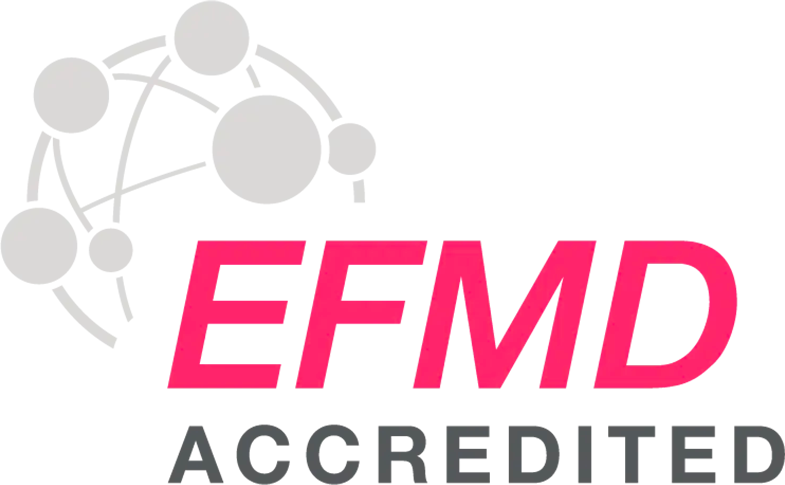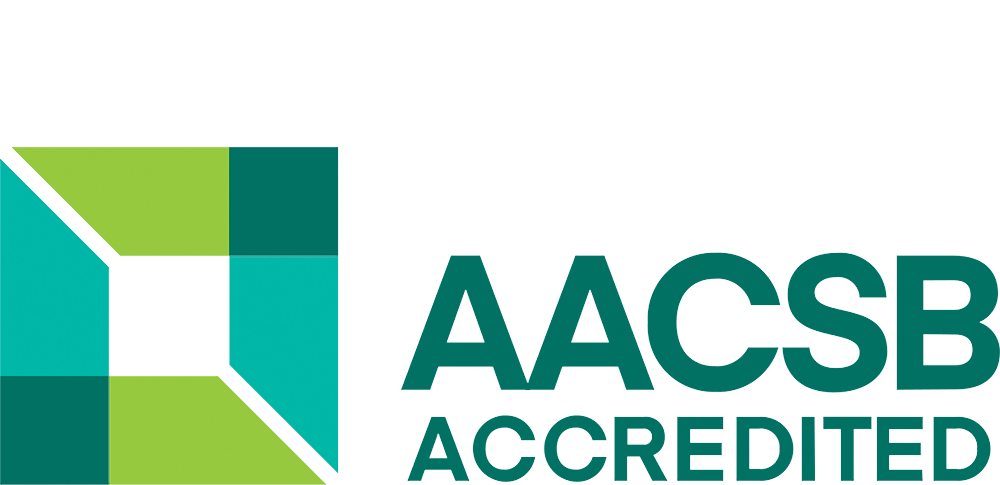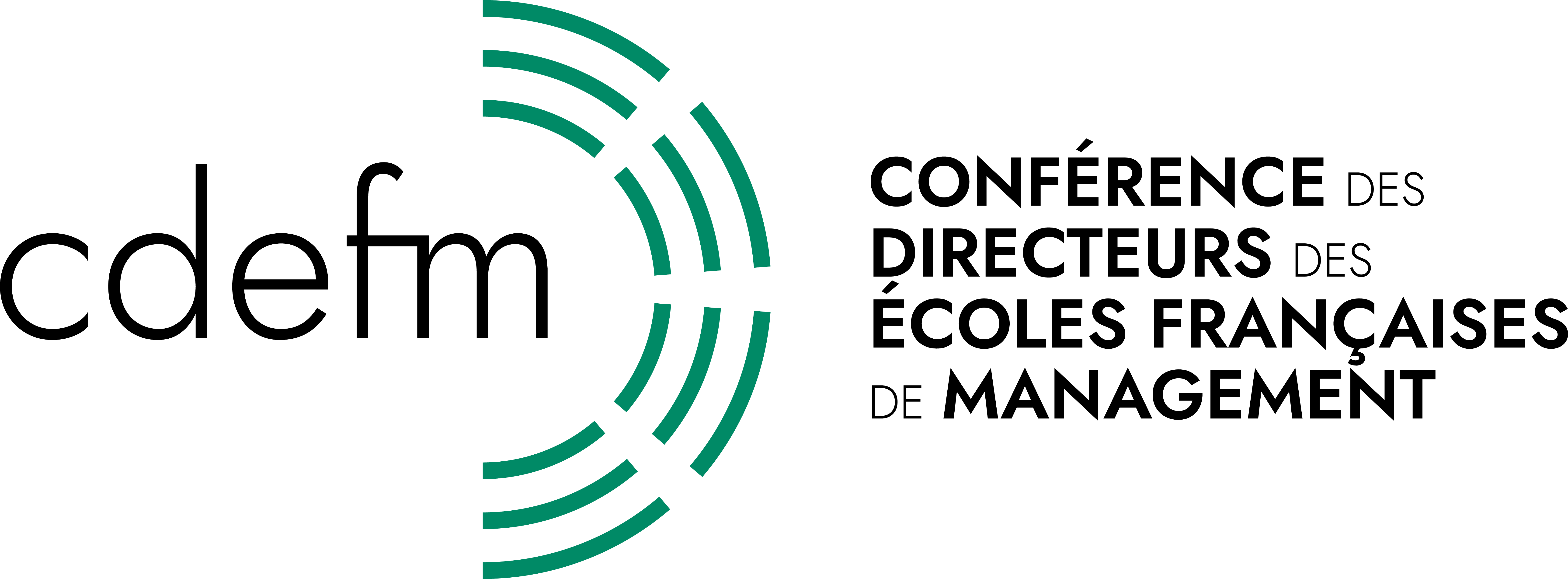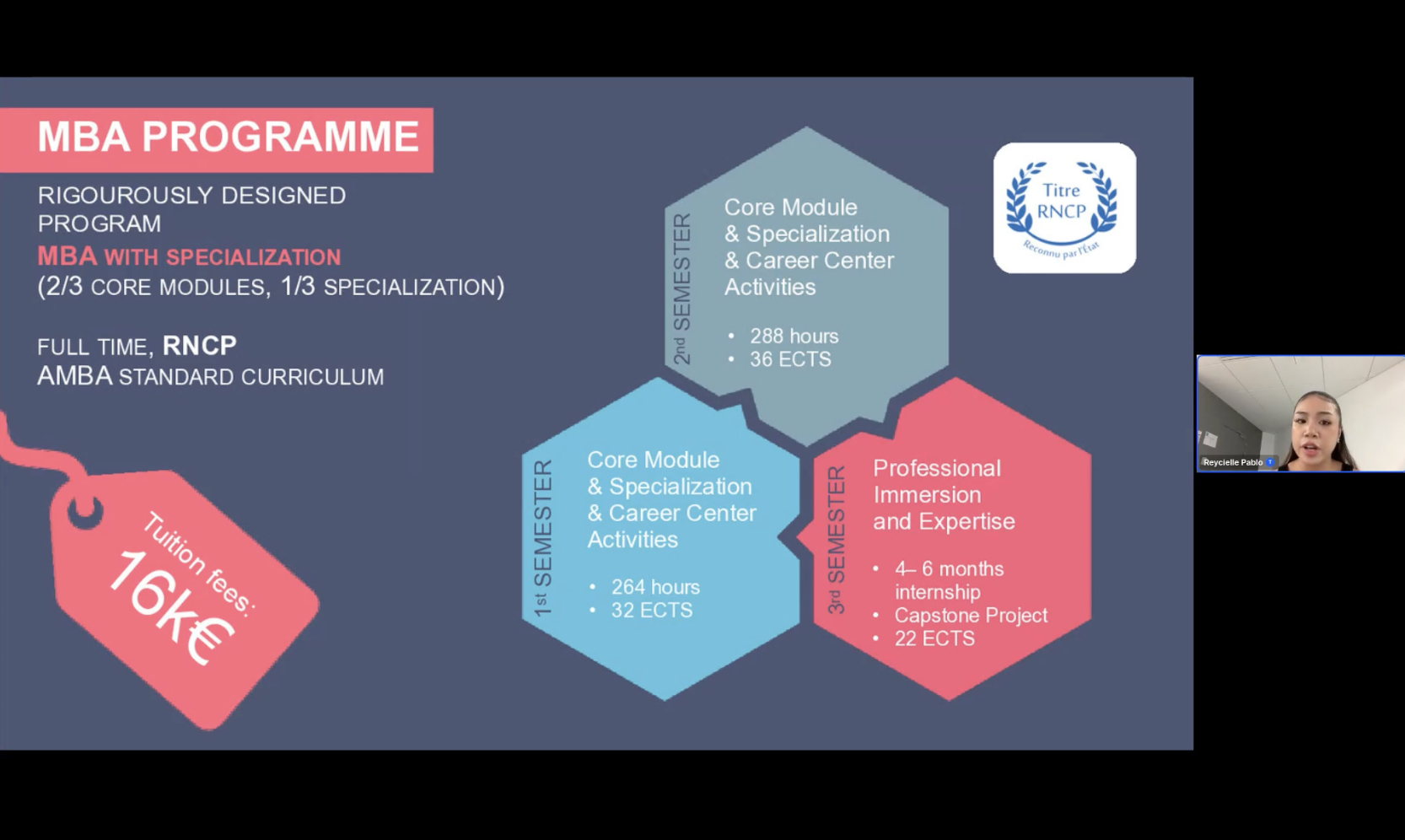20 Jan

Webinar - Opening of Parcoursup & Our Programs
Are you thinking about your career path this year?


Intake
Pace
Graduation diploma
 English
English
Presentation
The IPAG Business School MBA is an international programme at Bac+5 level, focused on developing strategic management skills in a globalised, digitalised and constantly changing environment. It is aimed at students with a minimum of a Bac+3 degree (180 ECTS) and lasts 18 months.
This MBA prepares learners to manage multicultural teams, lead complex projects, and make ethical and responsible decisions in contexts strongly impacted by emerging technologies.
The programme leads to the professional certification ‘International Business Development Manager’, registered with the RNCP under code no. 37738 (level 7), issued by PPA Business School, and registered in the National Directory of Professional Certifications by decision of the Director General of France Compétences on 7 July 2017 (accessible via the VAE).
As part of this unique RNCP qualification, four specialisations are offered at IPAG:
International Business Development
Finance & Investments
Digital Strategy Design & Transformation
Energy & Sustainability Transformation
Each specialisation allows students to develop sector-specific expertise while drawing on the five skill sets outlined in the national reference framework, particularly in:
At the end of the programme, students obtain a level 7 professional certification (equivalent to a master's degree), enabling them to apply for senior positions, including unit manager, strategic project manager, business developer, digital transformation manager and organisational strategy consultant.
*The MBA International Business Development is ranked 25th in Eduniversal's top 30 best masters courses.

Dual Degree
The MBA x MSc Digital Entrepreneur & Project Management is a 2 years dual Degree.
Our dual degree programme blends the Master of Business Administration (MBA) with a Master of Science (MSc) in Digital Entrepreneur & Project Management, the latter being delivered 100% online.
At the end of the first 12 months of the MBA, you will have the opportunity to acquire additional digital skills by joining the Online MSc in Digital Entrepreneur & Project Management and at the same time gain major work experience on a 12-month work study degree.
Admissions
SUR DOSSIER + ENTRETIEN
Admission requirements
• BAC+3 (180 ECTS)
• Level of English equivalent to TOEFL IBT (internet-based test: 80) or TOEFL PBT (paper-based test: 550) or TOEIC (780) or IELTS: 6.0 or Cambridge (FCE)
• At least 3 years' professional experience
Students who do not meet the English requirements may be admitted based on the assessment of the application file, but they are not eligible for the RNCP title or MSc degree.
Application form
• CV and covering letter
• Copy of diploma
• Copy of report cards for the year of graduation
• Result of the English test
• Letter of recommendation is a plus (to be sent directly to admissions@ipag.edu)
Stages in the admissions procedure
• Assessment of the application file
• Cover interview - in English
MBA in Paris: Improve your skills with our 5-year MBAs To find out more
The MBA, Master of Business Administration is an Anglo-Saxon degree, created to train high-potential executives, enabling them to acquire managerial skills and a global vision of the company. This training is intended for students as well as for profiles already justifying several years of professional experience.
This prestigious diploma is considered a real professional springboard and is particularly prized and is growing rapidly in France. There are several thousands of them worldwide, some generalists and others more specialized. Don't hesitate to compare them and consult the ranking of the different MBAs to make your choice.
The MBA is designed to be a generalist but firmly practice-oriented degree, which is mainly addressed to technicians, from very different professional backgrounds, who want to take up managerial or even executive positions in a business. It thus aims to develop managerial skills for technical profiles who want to progress in their professional career.
Lectures are becoming rarer and give way to case studies and company projects, with the goal of exchanging as much knowledge as possible between participants. The work is also done in groups, so that students develop certain essential skills, such as diplomatic skills.
It is also an internationally oriented training: a large part of the courses is given in English, and a class often welcomes many international students.
It should be noted that the MBA is a diploma that generally targets profiles who already have experience in the professional world (at least 3 years), and who would be willing to acquire a double expertise. Nevertheless, MBA admissions are often open to students with 4 or 5 years of higher education without experience.
The Master's degree can be completed in two years (M2). It is a 4-year / 5-year degree, normally awarded by universities, but some Grande Ecole programs (such as the IPAG Grande Ecole Programme) can also be awarded the Master's degree.
The cost varies depending on whether it is taken at a university or at a private school, such as a business school.
The French "Conférence des Grandes Ecoles" accredits certain school courses as Specialized Masters (MS) or Master of Science (MSc). These degrees allow students with five years of higher education or four years of higher education with professional experience to acquire a specialisation or a double qualification.
The disparities between these diplomas are slight, as their objective is more or less the same: to help students adapt to the realities of the company and provide them with the necessary skills to be immediately operational. Nevertheless, the MBA aims to specifically train future managers who wish to boost their careers, whereas the Masters are more technical courses.
The main difference between a master's degree and an MBA is its cost. In fact, a master's degree in a university implies minimal tuition fees compared to an MBA.
The target audience for these courses is also different: an MBA is more aimed at working people who want to enhance their skills or even give their professional career a new direction, while admission to a master's degree is open to graduates with a bachelor's degree.
We can also mention the importance of English in the teaching of a Master of Business Administration compared to that of a Master's degree.
Lastly, the organisation of courses is more flexible in an MBA, since it can be completed in one or two years, in a classroom or continuing education program... while the Master's follows the European LMD system: a Master's degree is obtained by validating two semesters, thanks to ECTS credits.
MBAs are known to be very expensive. Their costs can amount to several tens of thousands of euros in the major schools. There are several ways to fund MBAs :
There are many reasons to do an MBA. First and foremost, you need to ask yourself about your professional ambitions because an MBA is a real commitment in terms of time and money.
For technical people (lawyers, engineers), an MBA is an opportunity to acquire a highly prized double skill, and then to progress in the company.
One of the main objectives of an MBA is to learn how to manage. Through this training, the student acquires a cross-functional vision of the company and the skills that are essential to management functions. You learn how to work in a team, make decisions quickly, be diplomatic... By joining this program, you will also add an international dimension to your CV, thanks to the courses given in English and the great cultural diversity found in the promotions.
Naturally, displaying an MBA on your resume is highly valued, especially in terms of salary! An MBA graduate could be entitled to an annual salary of between €60,000 and €80,000 gross, depending on the graduate school he or she has joined.
Finally, one of the advantages of an MBA is the network you will have access to. In fact, you can quickly make very profitable contacts with other participants, lecturers and alumni.
After completing an MBA, it's time to apply your newly acquired skills, be it by returning to your original company, to a management position, or by starting out on the job market again. By including the MBA on your resume, many opportunities and jobs will open up to you and you will obviously be able to qualify for a higher remuneration.
Some MBA graduates, now mastering the basics of business management, do not hesitate to launch themselves into the entrepreneurial path.
To sum up, now is the time to make your professional project a reality!
Working alongside students from all over the world, you will learn to manage teams and steer projects ethically, in an environment increasingly influenced by digital technology. The MBA is a passport to top-level management or consultancy.
Core modules
- Strategy
- Management Accounting and Finance for Managers
- Operations and Supply Chain Management
- Organizational Behavior, Leadership and Change Management
- Responsible Business Conduct and Sustainability Reporting
- Human Resources & Diversity Management
- Marketing
- Innovations & Digital Transformation
- Climate Change and Contemporary Economics Issues
- International Business Law
- Project Management
- Artificial Intelligence and Data Modelling for Business
Personal and career development:
Our MBA combines four specialisation choices with hands-on learning, real-world projects, and strong professional and personal development support.
Internship and project realisation
Projects & Business Games
Objectives
- Understanding the impact of the digitalisation of the economy on different industries and business models
- Managing the digitalisation of a company's value chain
- Digital marketing and distribution, and managing innovation and methods
- Supporting change as a consultant
Courses
Career
Objectives
- A holistic approach to sustainable development
- Development of a sustainable business model
- Knowledge of international policies and the legal framework for sustainable development
- Management of sustainable development projects (indicators, team management)
- Financing sustainable development programmes
- Marketing and communication applied to sustainable development
- Mastering and implementing the concept of a closed-loop supply chain
Courses
Career
Objectives
- Proficiency in investment management tools, including the main drivers of
machine learning applications
- Knowledge of local regulations
- Integration of environmental, social and governance criteria into asset management
- Ability to communicate with quantitative specialists on engineering applications (big and smart data)
- Development of financing projects for sustainable investments
Courses
Career
Objectives
- Understanding the specific characteristics of regional and global markets
- Mastering the principles and rules of international trade
- International negotiations
- Evaluating and developing international business
Courses
Career
Tuition fees
10% discount on tuition fees for applications submitted before December 15!
Un Career Center pour vous accompagner
Que vous soyez à la recherche d’un stage, d’un emploi ou tout simplement de conseils, notre Career Center est là pour vous aider. Vous bénéficiez tout au long de votre cursus de ses nombreux services : préparation aux entretiens, relecture de CV, forums de recrutement, ateliers de prise de parole, maîtrise de son image, gestion des réseaux sociaux professionnels…
Frais de scolarité
Discover the MBA Program at IPAG Business School!
Watch the replay of our webinar with Reycielle PABLO, our International Promotion Officer, by simply filling out the form below. You will discover, at your own pace, all the key information about the program, including the different specializations offered and career opportunities.
This replay presents an internationally-oriented study program, and you will find answers to all your questions from the comfort of your own home!

Application
Contact